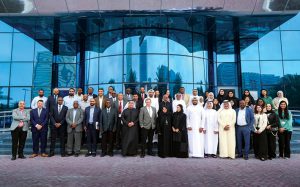DUBAI / WAM
The Ministry of Climate Change and Environment (MOCCAE) held a workshop in its headquarters under the theme, “Modelling the Spread of Animal and Common Diseases”, as part of its efforts to strengthen the biosecurity system, including protecting livestock from diseases, taking precautionary measures to protect animals from epidemics, improving veterinary health, promoting public health for consumers of animal products, and avoiding diseases that are common to humans and animals.
The two-day workshop was attended by Dr Mohammed Alyafei, Dean of the College of Agriculture and Veterinary Medicine at UAE University, Ibrahim Al Dhanhani, Director of Environmental Disaster Department at the MOCCAE, and leadership from different sectors in the ministry. The workshop was also attended by more than 50 officials, specialists, and stakeholders from Federal, local and security authorities and the academic sector. The workshop was presented by Professor Aaron Reeves, Senior Research Epidemiologist, an expert in digital modelling and simulation of potential scenarios of epidemics, diseases, and environmental disasters. Reeves, who works at the RTI International, a research institute — in North Carolina, USA, specialises in providing solutions using advanced applied research, and was part of the team that dealt with the Covid-19 pandemic in the UK.
The workshop was also presented by Dr Ehab Fath Al Rahman and Prof Youssef El Khatib from UAE University, as well as Prof. Magdy Mahmoud from the MOCCAE, and Dr Yassir El Tahir from the Abu Dhabi Agriculture and Food Safety Authority. Ibrahim Al Dhanhani said, “At the Ministry, we are keen to update our human resources on the latest experiences and scientific practices to strengthen national biosecurity at all levels. The workshop on ‘Modelling the Spread of Animal and Common Diseases’ reflects this approach, through which we aim to increase our animal wealth and care in accordance with the best international standards. The workshop also aims to improve knowledge about the concept of modelling and strengthen preparedness and prediction of potential and unexpected epidemics and environmental disasters.”
Dr. Alyafei also pointed out that the workshop further builds on the joint efforts between the Ministry and the University as part of a MoU between the two entities, in which many joint research projects have been conducted and published in prestigious scientific journals.
During the workshop, practical training and digital modelling were provided to represent the process of animal disease transmission (i.e. zoonotic diseases) between animals and humans, taking into account the interaction with humans. The workshop also introduced the concept of stochastic modelling, algorithms, potential scenarios and exploring the future to assist policy and decision makers in planning responses to low-probability, but high-impact disasters.
 The Gulf Time Newspaper One of the finest business newspapers in the UAE brought to you by our professional writers and editors.
The Gulf Time Newspaper One of the finest business newspapers in the UAE brought to you by our professional writers and editors.
